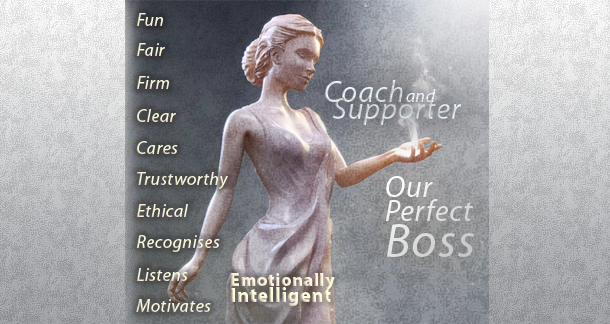The 17 Essential Elements of the Perfect Boss

In this series, we are talking about 6 key drivers that come up time and again in the research on employee engagement. This is part of #1: Good Direct Boss
Do you know the word Pygmalion?
It is the name of a play (later turned into the musical My Fair Lady) in which a professor tries to train a flower girl, Eliza, to pass for a duchess. The most important element of this, he believed, was impeccable speech. The word comes from Greek mythology; the name of a man who fashioned an ivory statue of a beautiful woman and loved it so deeply that, in answer to his prayer, Aphrodite brought it to life.

The play is about the potential (and limits) of sculpting an individual's character. It's something that we are often faced with in our work with debriefing personality assessments to managers. It's unlikely that "impeccable speech" would ever be found on the job description for a modern day manager, but the idea of "the perfect boss" is very intriguing.
What kind of boss would create super high levels of engagement, yet achieve results?
In 2009, Google tried to answer the question for themselves with "project oxygen." It took them about 2 years to define a list of 8 essentials for their own "ultimate boss" (which you can Google if you like).
With this in mind, and using the best insights from leading research firms, management consultants, leadership authors, and our own weighty personal bias, we have created our own monument to a great boss. (Something you can do with your team too if you like).
She contains 17 essential elements, forming the raw materials for building a highly engaged team of high achievers.
1. Supporter, Not Dungeon-Master - The question: "who do you serve, your own interests or others?" is the most fundamental question that anyone in a position of power can ask. It's hardly some philosophical, abstract question. A dictatorship, whilst expedient in the short term, is never durable in the long term. People will become engaged only if they feel supported. Our ultimate boss would help them perform, learn and grow; equip them well, make sure they have the right tools, then get out of their way.
2. Human Beings, Not Human Capital - Similar to the previous point, there is a common mindset in business very similar to the 'dictator' mindset. It is the 'people are expendable' mindset. People are not money, they are not mechanical units. They are not things, needing to be controlled. They are human beings with feelings. Our ultimate boss would never talk about her team as "human capital." She knows there is nothing more soul destroying than overhearing someone talking about you like an expendable pawn in a black and white game.
3. Know Yourself - Our ultimate boss is highly self-aware. She reflects on her strengths and weaknesses. She as the rare ability to step out of her skin and mentally see herself thorough the eyes of others. This skill, self-knowledge, is the basis of emotional intelligence and effective decision making as a manager.
4. Know Your People - Our ultimate boss appreciates the psychological breadth of her team. She knows their communication style, their motivations, their interests, their goals, and what makes each of them tick. The quickest way to fail as a manager is to assume that everybody responds to the same management style. A piece of advice given to one person may motivate them into action, while the same advice may insult or demoralise another. Engagement is too delicate to apply a cookie cutter approach.
5. Know Trust - Trust is the intangible currency that all businesses and business people deal in, and is equally as important as its tangible counterpart - money. It is an umbrella term for many different properties, but if you don't have the ability to understand the nature of trust, you won't have any kind of power to create engagement. Our perfect boss thinks about these questions often:
- Do you understand the behaviours that build and destroy trust?
- Do you walk your talk?
- Do you keep your commitments and promises?
- Do you get dirty in the trenches or sit in an ivory tower?
- Do you have integrity in their eyes?
- Are you fair and ethical?
She would also have every new team member read "The Speed of Trust" By Stephen M. R. Covey.
6. Be Clear, Very Clear - She would make expectations clear, make accountabilities clear, make KPI's clear; everyone's responsibilities and duties would be clear as day. People should always know which direction they are headed, what the vision, mission and values are, and where they stand. Nobody should ever be fired without seeing it coming from a mile off. No surprises. In the words of Marcus Buckingham: “if your nothing else as a leader, be clear.”
7. Listen First - Opinions are included, heard and acknowledged as much as possible. She is never dismissive. She would never assume that someone has done something wrong, until consulting their side of the story. She lives by Stephen Covey's 5th Habit: "Seek first to understand, then to be understood."
8. Communicate Often - There's nothing worse that feeling like your being kept in the dark. Not everyone needs to socialise to the same degree, but everyone wants to feel like they are being kept in the loop. She would talk to them about why their work matters, talk about their progress and let them know that her door is open at all times.
9. Criticise Well:
- “Sandwich” criticism. Good – Bad – Good. E.g. "Here's what I really like... here's the thing we need to spend more time on... but overall I'm really impressed by..."
- The best criticism is clear, specific and non-personal, the worst kind of criticism is vague, general and personal. It's the difference between "Why are you such an illiterate idiot?" vs "this paragraph hasn't been given the spell check by the computer".
10. Coach, Don't Boss - Nike's "just do it" philosophy is great as a personal mantra, but "teach a person to fish" works better from a management perspective. The "boss-as-coach," is a person that creates an empowering environment; she is interested in getting the gears in each team member's mind working to solve their own problems, coming up with better solutions, taking initiative, and learning to become more responsible, self-aware and self-sufficient in the process.
11. Increase Their Ownership - This is at the heart of engagement. People will work relentlessly if they are personally invested in something, such as an idea they came up with for a new project. Ensure new team members take personal ownership and pride in their projects by making sure that their ideas are incorporated in some way. Even the smallest way.
12. Increase Their Autonomy (Decrease Micromanagement) - It's possibly the most difficult thing to practice as a manager, but autonomy means to enable someone to be self-directed; to have some level of control over their day-to-day tasks. It doesn't work for all types of jobs and some managers will never be able to move away from "do this/do that" to "what do you think?" Our rule is to assume that micromanagement & disengagement have a perfect correlation and go together on one end of a scale (0%) and at the other end of the scale sit autonomy & engagement (100%). Consider: how much fun is having your entire life dictated to you? (Hint: it's not above 50%).
13. Kill Bureaucracy - As the saying goes "Put a good person in a bad system and the system will always win."Nothing stifles engagement faster than a system that isn't designed to support it. Our manager would do her best to shield team members from negative influences internally.
14. Take Feedback - Our perfect manager would know she's not actually perfect. No manager is. She would seek suggestions about how she could do her job better. She encourages people to speak up if they think her ideas are wrong. She reflects (and acts) on the feedback.
15. Recognise Regularly - One of the most interesting things about research into engagement has been that intrinsic rewards (e.g. a pat on the back, a compliment, an acknowledgement of hard work) have been found, in many cases, to be more effective than extrinsic rewards (e.g. money). Knowing this, she compensates her team well, but regularly appreciates them in small ways too.
16. Set High, Achievable Standards - Our ultimate boss looks for ways to make projects challenging by creating stretch goals. Nobody is engaged by boring, repetitive tasks. People need tasks that involve an element of difficulty; not so much that they are overwhelmed; not so much that they find it too easy; just enough to push their creativity.
17. Play to Their Strengths - "If you judge a fish by its ability to climb a tree, it will live it's whole life believing it is stupid." Einstein's quote reminds us that we all have strengths, but they may not always be aligned to a role. Our ultimate boss would find ways to re-mould their jobs to bring out the things they are naturally good at.
We have all heard that "people don't leave companies, they leave managers." It's also true that the boss has the most direct influence on an individual's level of engagement. The list above is a framework that is supported by both academic research and road tested experience, but it cannot be perfect for every job in every industry. In this regard, the perfect manager is in the eye of the beholder.

What do you think? Do you agree with our sculpture?
What would you add or subtract from the form in order to build the ultimate boss that creates a group of highly engaged workers?

Theo Winter
Client Services Manager, Writer & Researcher. Theo is one of the youngest professionals in the world to earn an accreditation in TTI Success Insight's suite of psychometric assessments. For more than a decade, he worked with hundreds of HR, L&D and OD professionals and consultants to improve engagement, performance and emotional intelligence of leaders and their teams. He authored the book "40 Must-Know Business Models for People Leaders."

/Unlocking%20Efficiency_%20The%20Power%20of%20Frontline%20Insights%20in%20Process%20Improvement.png?width=374&name=Unlocking%20Efficiency_%20The%20Power%20of%20Frontline%20Insights%20in%20Process%20Improvement.png)
/From%20Daily%20Tasks%20to%20Strategic%20Impact%20Empowering%20Frontline%20Team%20Members%20to%20Work%20On%20Their%20Job.png?width=374&name=From%20Daily%20Tasks%20to%20Strategic%20Impact%20Empowering%20Frontline%20Team%20Members%20to%20Work%20On%20Their%20Job.png)
We Would Like to Hear From You (0 Comments)